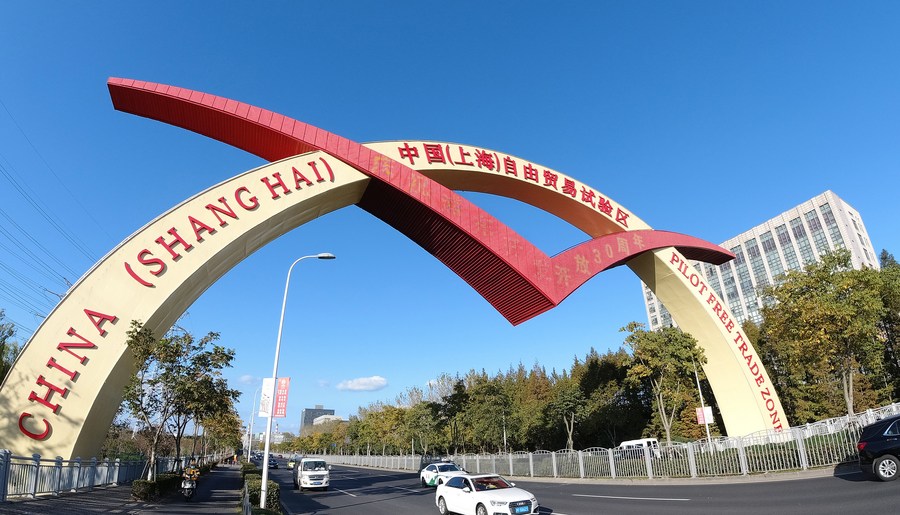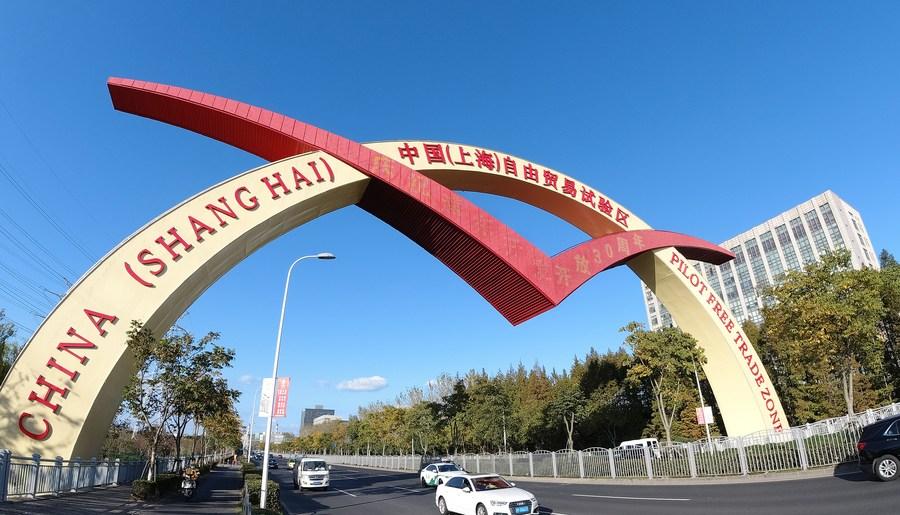
Photo taken on Nov. 11, 2020 shows a view of the China (Shanghai) Pilot Free Trade Zone at Pudong New Area in Shanghai, east China. (Xinhua/Fang Zhe)
BEIJING, March 10 (Xinhua) -- The National Development and Reform Commission (NDRC), China's top economic planner, will focus on five aspects to stabilize foreign investment in 2021, reported yidaiyilu.gov.cn Tuesday quoting Ning Jizhe, deputy head of NDRC.
The first is to further cut the negative list for foreign investment access.
Ning pointed out that from 2017 to 2020, China has revised the negative list for foreign investment access for four consecutive years, reducing the restrictive measures by nearly two-thirds.
This year, China will continue to shorten the list, cement opening-up in the manufacturing sector, foster the orderly opening-up of the service sector, introduce advanced technology, management experience and business models more widely, and make better use of pilot free trade zones in expanding opening-up.
The second is to continue to expand the areas in which foreign investment is encouraged.
The new-version catalogue of industries that encourage foreign investment was formally implemented in January this year, with 127 fields newly added.
Next, efforts will be made to encourage more foreign investment in advanced manufacturing, high-tech, energy conservation and environmental protection, producer services like research, development and design, modern logistics and information service, as well as the mid-west and northeast China, according to Ning.
The third is to promote the implementation of major foreign-funded projects.
So far, the special work team for major foreign-funded projects led by NDRC has rolled out four batches of major foreign-funded projects with total investment exceeding 110 billion U.S. dollars.
The team will launch the fifth batch of such projects this year, and provide them with industrial planning, land use, environmental impact assessment, energy consumption and other policy support.
The fourth is to fully implement the post-establishment national treatment for foreign investment.
The series of tax, financial and social security policies that have been adopted since 2020 to help companies bail out will be equally applicable to foreign-funded firms.
Besides, efforts will be made to continue to promote equal treatment in accordance with the law for both foreign-invested and domestic-funded enterprises in government procurement, land supply, tax and fee reduction, qualification accreditation, standard setting, project application, and human resources policies.
The fifth is to effectively strengthen the oversight of services for enterprises.
Efforts will be made to publicize relevant policies and measures to foreign-funded firms in a more proactive manner, enhance information services through various channels, and actively coordinate and resolve difficulties facing foreign-invested projects in investment, production and operation, so as to create a more convenient environment for foreign-invested enterprises to invest in China.
Efforts will also be made to continue to improve the pre-establishment national treatment plus negative list management system and the rules on foreign investment security review, and work for the establishment of a fair, transparent, efficient and safe regulatory system that is in line with high-level opening-up and international norms, creating a favorable investment environment.
According to Ning Jizhe, in 2020, the foreign direct investment received by China in the non-financial sectors increased by 4.5 percent year on year to 144.4 billion U.S. dollars, and in January this year, the foreign capital used by China rose by 6.2 percent year on year to 13.5 billion yuan.
A white paper on China's business environment released recently by the American Chamber of Commerce in South China shows that 94 percent of U.S. companies are optimistic about the Chinese market, with more than half of them making China their top choice for global investment.
(Edited by Gu Shanshan with Xinhua Silk Road, gushanshan.1987@163.com)




 A single purchase
A single purchase









